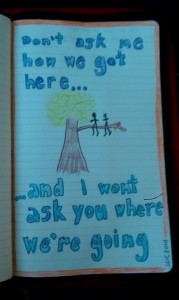Listen to this poem using the player above.
/ / /
This is the first poem of the year for me, although it’s the third one to make it to this site in 2011. One note: The person 99% of you know as my father is not the person mentioned in this poem, which refers to my biological father.

Perchance to dream
On the first night in my new apartment —
after fifteen years of sleeping in our bed —
I closed the door to my bedroom,
pushed it tight until the latch clicked home.
On that first night I was a boy again,
waiting for the yellow eyes to appear
around the corner at the end of the hallway
like they had night after night when I was a child.
For years I was afraid of partially opened doors,
preferring to see nothing or to see everything;
to know what fate had in store the moment it
lumbered around the corner, thirsting for me.
Even earlier in childhood I’d had a similar dream.
I was in my bed in my pajamas with the feet on them,
and the door to the hallway was open and I could hear
the footsteps, the heavy pounding on the wooden floor.
One night my mother came through the bedroom window,
snuck in under cover of darkness and spirited me away
from the party going strong in the living room
while my drunk father was supposed to be watching me.
I don’t know when he first discovered I was gone
or what he did next. I like to imagine him in a panic,
searching for me, tearing the house apart, tears on his cheeks —
like he failed to do all those years.
But I’m sure it was nothing so dramatic. Probably a phone call
to my grandparents’ apartment on Main Street.
My grandfather would have picked up the phone in his quiet way.
“Yes, they’re here. They’re sleeping.”







